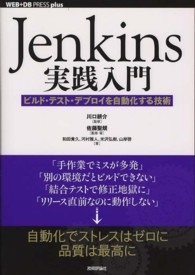Full Description
The issue of competence division is of fundamental importance as it reflects the 'power bargain' struck between the Member States and their Union, determining the limits of the authority of the EU as well as the limits of the authority of the Member States. It defines the nature of the EU as a polity, as well as the identity of the Member States. After over six years since the entry into force of the Lisbon Treaty, it is high time to take stock of whether the reforms that were adopted to make the Union's system of division of competences between the EU Member States clearer, more coherent, and better at containing European integration, have been successful. This book asks whether 'the competence problem' has finally been solved.
Given the fundamental importance of this question, this publication will be of interest to a wide audience, from constitutional and substantive EU law scholars to practitioners in the EU institutions and EU legal practice more generally.
Contents
Part I: General Reflections
1. The Division of Competences between the EU and the Member States: Reflections on the Past, the Present and the Future
Sacha Garben and Inge Govaere
2. The Competence Divide of the Lisbon Treaty Six Years After
Christiaan Timmermans
3. Classifying EU Competences: German Constitutional Lessons?
Robert Schütze
Part II: Areas of Complementary, Shared and Exclusive EU Competence
4. Exclusive Member State Competences—Is There Such a Thing?
Bruno De Witte
5. The Competence to Create an Internal Market: Conceptual Poverty and Unbalanced Interests
Gareth Davies
6. Monetary Policy: An Exclusive Competence Only in Name?
Michael Waibel
7. The EU's Exclusive Competence in Competition Law
Pablo Ibáñez Colomo
8. EU External Competence—Rationales for Exclusivity
Marise Cremona
9. Competence, Human Rights, and Asylum: What Price Mutual Recognition?
Takis Tridimas
Part III: Practical Perspectives
10. The Exclusive Competences of the European Union: Some Random Jottings
Kieran Bradley
11. The Lisbon Treaty's Competence Arrangement Viewed from European Commission Practice
Karen Banks
12. The Lisbon Treaty's Competence Arrangement Viewed by the European Parliament
María José Martínez Iglesias
13. The Institutional Politics of Objective Choice: Competence as a Framework for Argumentation
Päivi Leino
Part IV: Critical Refl ections on Legitimacy and Proposals for Reform
14. Integration through Soft Law: No Competence Needed? Juridical and Bio-Power in the Realm of Soft Law
Mark Dawson
15. Refining the Division of Competences in the EU: National Discretion in EU Legislation
Ton van den Brink
16. The Shifting Powers of the European Parliament: Democratic Legitimacy and the Competences of the European Union
Gregorio Garzón Clariana
17. De-constitutionalisation of European Law: The Re-empowerment of Democratic Political Choice
Fritz W Scharpf
18. Restating the Problem of Competence Creep, Tackling Harmonisation by Stealth and Reinstating the Legislator
Sacha Garben








